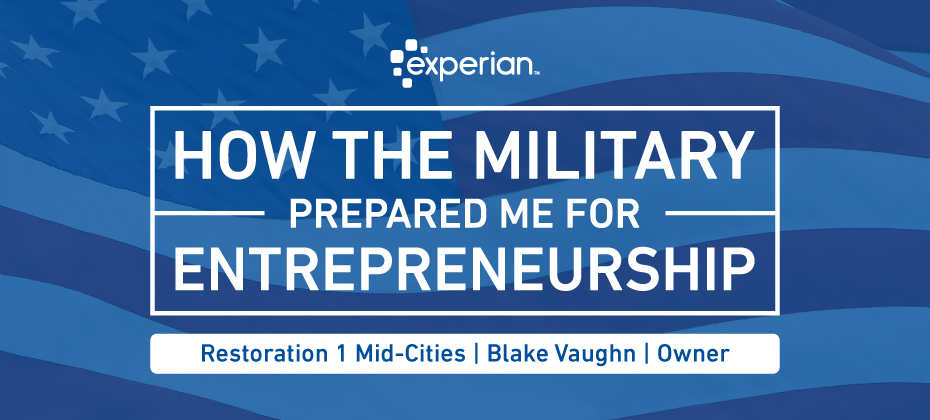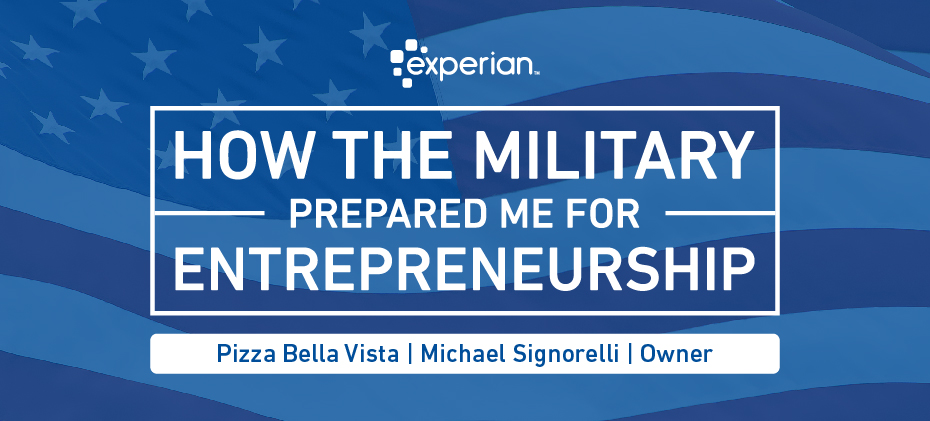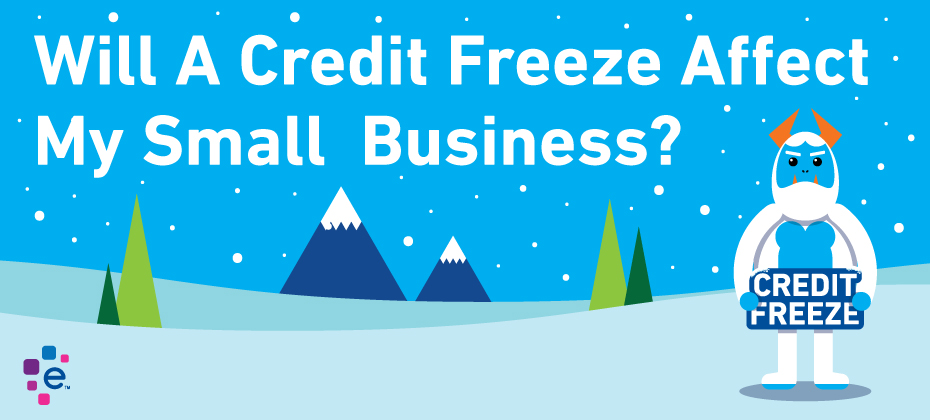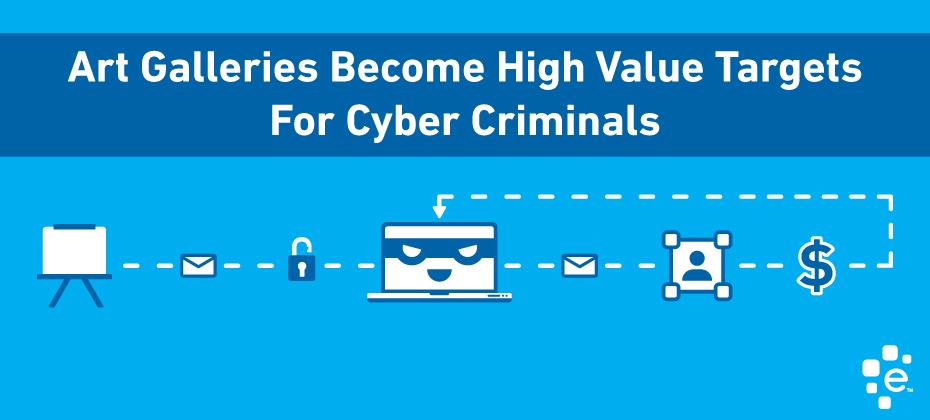Topics

Experian Business Information Services has been honoring Veteran Entrepreneurs in the month of May on the Small Business Matters blog featuring a series of posts highlighting military veterans who went into business for themselves. We asked them about making the transition from military to small business, what challenges they faced, and how their career in the service prepared them to run their own small businesses. A common thread among the veteran entrepreneurs we’ve interviewed for this series is family. They came from a military family, they built a family with those who work in their business, or they left active duty to spend more time with their family. To these veterans, it is an honor and duty to serve their country. They show the same commitment and respect to those closest to them. With a family legacy of military service, entrepreneurship and a “passion to serve”, this veteran honors his heritage by sharing his story, starting with his father’s choice to join the Army. In his late teens, Blake Vaughn’s father was involved in a deadly bar fight. When he was given the choice to go to prison or join the Army, he chose to serve. He left the military early to take care of his ailing parents, and, after his parents died, he took in his siblings as well. He soon started his own family and worked for the post office before going into business for himself. In 26 years, he grew his business from nothing into a multi-million-dollar company. Between the 2001 recession and a divorce, the family suffered multiple setbacks, including foreclosure on their home. After the divorce, Blake, still, a teenager, decided he needed to do something to help lift his family out of poverty and help his mother put food on the table. He decided to follow in the footsteps of his father, grandfather, uncles, and brother and join the military. What did you like most about serving in the U.S. Military? “Serving my country and building strong relationships with people. On a personal level, it’s fulfilling to know you’re participating in something greater than yourself. I feel weird and undeserving when someone says, “thank you for serving.” I think of my brother… his vehicle was destroyed by an IED. Thankfully, nobody got hurt. I don’t like to compare the two of us but at the same time, I at least participated in the security of the country. I’ve always had a huge love for our history, values, the Constitution and our country. My wife homeschools our son and part of that is history… so from the perspective of serving in the military, sharing that with my son is cool. The most enjoyable part is the people and the camaraderie. I was a junior officer, so I learned the leadership that comes with that. I’m a big fan of leadership and personal development. As a leader, people don’t care how much you know until they know how much you care. I am more interested in getting to know people first and building relationships and letting them shine. By doing that, I had some excellent relationships with those guys I led. I still have great relationships with them.” What inspired you to make the transition to entrepreneurship? “My father was a veteran and entrepreneur. He was given the choice to go to prison or go to the army after a bar fight. He chose to serve and straightened up his life. He got out and worked for a little while until he decided to start his own business. He built a $12 million business and then lost it after 20+ years. I wanted to serve just as my father, grandfather, several uncles, and brother did as well, but I also wanted to pursue entrepreneurship because I saw the satisfaction that comes from creating something for your family.” Blake worked through college earning his MBA in marketing while waiting to go into the military. Due to delays in his selection process and a government sequester, it took many years before Blake was finally able to attend officer candidate school in the Navy. He served as a gunnery/ordnance officer on the USS CHAFEE in Hawaii before exiting with an honorable discharge into the reserves. In that time, he also married his college sweetheart, whose first husband had passed away and left her with a 1-year-old son. Between his time working through college and after leaving the military, he “bounced around to all areas of business”, working various customer service, finance and hospitality jobs before finally taking the entrepreneurship leap. Tell us about your business. “We started our first business, a restoration franchise in August 2016, handling water and fire damage. Our second business, Patriot Services Construction, started in May of 2017. In our first calendar year, we generated $1.1 million in gross revenue. For our 2nd full year, we hope to close over $2M. We’re also adding roofing to our services.” Blake’s business can be found online here: Restore NTX LLC & Patriot Services LLC What skills from your military career do you apply most often to your business? “Administrative, risk assessment and management, program management, leadership, motivation, inspection, and accountability. It (the military) was extremely grueling work. Only about 2% is cool. The other 98% is mundane repetitive tasks. It can tear you down, so you have to keep focused and motivated to do what’s necessary because if the country calls on you, you have to be ready. I find fulfillment from motivating people and that allowed me to press harder and stay focused. It was a great learning experience for me.” Did you access Government programs to launch your business such as SBA loans? “Yes, we did get an SBA 7A loan for $110K when we first started. We combined that with personal funds and I took on a partner when we started - a guy I know from church named Jeff Lott. We both wanted financial freedom and control of our time. We partnered together to buy vehicles and equipment to launch our business. There’s a book called Rocket Fuel that talks about the combination of visionaries and integrators when building a business. The book is good. I’m a visionary. I look for new revenue sources and he’s the integrator. We compliment each other in business. We’ve found a really good spot. It’s been an excellent partnership.” What is the biggest challenge about being an entrepreneur? “Facing the unknown and taking risks that could cost us greatly. I took away from the military, and my time during training especially, that you’re used to having pleasures in life, being comfortable, and they strip that away… 6 months living out of a backpack. You learn perseverance. You don’t need a lot to live. It allows you to lay it all on the line when you do have challenges. Entrepreneurs, when failure looks like it could happen, they begin to backtrack. Several people I know went back to their corporate jobs. You have to define what is essential and get rid of everything else that doesn’t take you closer to what’s important to you. It’s a challenge… “what if we fail”. Jeff and I didn’t have experience. In our industry, people typically use a direct sales force to get off the ground, build relationships with trade partners to refer work. We tried that and it didn’t get off the ground. Instead of getting scared, we looked into internet marketing instead. We shifted heavily into internet marketing. We have no salespeople whatsoever and 90% of our business now comes from internet marketing. Creating the right mindset is most important, and being willing to take a risk is part of that. As Grant Cordone says, “Commit first and figure it out later.” We also try to automate our business as best we can, taking advice from Tim Ferris’ 4 Hour Work Week. What is the greatest reward in being an entrepreneur? “Our technicians do hard work and their mindset is serving people, not just making money. It was nice to volunteer a short time in Houston after Hurricane Harvey and tracking through the disaster to help with recovery. We didn’t need to be directed. We knew what to do so we just got to work helping those folks. There’s also satisfaction in creating something important and it’s nice to have more freedom to enjoy life.”

For the month of May, as we head into Memorial Day, the Small Business Matters blog will feature a series of posts highlighting military veterans who went into business for themselves. We’ll ask them about making the transition from military to small business, what challenges they faced, and how their career in the service prepared them to run their own small businesses. Many veterans are attracted to military service because of world travel and learning opportunities. With permanent changes of station (PCS) and the responsibility of mobilization at a moment’s notice, active duty veterans will likely have visited several other countries before retiring or transitioning from the military. On these assignments, troops will find themselves in unfamiliar territory, unable to speak the language and often surrounded by people and cultures they do not understand. One such veteran immersed himself in the culture of his station in a foreign country and came back to the States inspired to build a business. Raised near Niagara Falls in an Italian/Polish community, Michael Signorelli grew up around good food and already considered himself a “foodie”. When he joined the Navy, he was offered an assignment working with NATO in Naples, Italy for 3 years. He imagined he would be enjoying a glorified version of the food he grew up eating. He realized immediately that “true Italian food from the motherland is wildly different from Italian American food”. For 14 years, Signorelli worked in administration, finance and personnel in the Navy. For his last 10 years, he was commissioned as a Limited Duty Officer. These assignments instilled business organizational skills and taught him how to train and lead people, skills that would be necessary for his future business. He’s currently running a successful Neapolitan pizza restaurant in Virginia. What did you like the most about being in the military? “I cherished every single tour of duty because I was able to learn something in every place I went and every job I had. Most of it was good. My approach was to learn something from everyone. Naples was my best tour. Who knew that tour would develop what I would do post-retirement? It would have been something along the lines of Italian food but if it wasn’t for Naples, I wouldn’t have even tried it. My second best tour was Djibouti, Africa. Our goal was to win the hearts and minds of the people to keep Somali warlords from setting up terrorist camps. I saw people struggle and build houses out of rocks - stacked them like you’ve never seen them stacked before…. Because of that time, I don’t like to waste things. It was rewarding and when I think I’m having a bad day or my kids or employees think something is challenging, I bring those moments up as teaching moments. If you don’t have the opportunity to see that, you’d never know. I worked with remarkable people that influenced me and made me a better leader and groomed me to be an entrepreneur. It gave me the tools, the exposure and diversity of the jobs. The Navy prepared me in a way that Harvard Business school couldn’t have. I loved every minute of it. I still interact with people in the Navy. We work hard but the payback is in experience. You can’t always be compensated in money.” What inspired you to make the transition to entrepreneurship? “Pizza making is a respected craft in Italy. It’s ingrained in their life, runs in their veins. When you show interest, they want to share their story. In Naples, even through the language barrier, I learned ‘survival Italian’ so I could learn everything I could about Neapolitan food and pizza. My lifelong dream was always to open a restaurant. I went through the rest of my Navy career always looking for that pizza. We ended up getting stationed near Buffalo, NY. We missed it so much we tried to get back to Italy, but we couldn’t, so we took a tour in Sardinia. I learned more about that unadulterated island where farmers and winemakers work into their 60s and 70s…. it’s just amazing. Back in states, we couldn’t find Neapolitan pizza unless we were going to New York City. I decided I’d one day open a Neapolitan pizzeria.” Tell us more about your business. “We decided, after I ended up in VA (after 14 years in the navy), we’d build a wood-fired oven in our backyard. We started cooking pizzas for ourselves, entertaining neighbors and friends. It was great practice. When we started thinking about retirement from the Navy, about 3 years before, I discovered a company in Colorado who was building wood-fired ovens on trailers – like a food truck - built to last for 10 years. For our $19,000 investment, we could test the market in Virginia to see if Neapolitan pizza would take off. We started doing small catering gigs and the popularity soared. We were requested to do corporate events, big weddings, local city events in the park… The craziness started but we still had full time jobs. My wife was permanent substitute teacher and I was still in the Navy. Evenings and weekends were spent doing these mobile events. It was a great platform and great training. We tested the market and got out of it what we wanted. Then it was time to hang it up in the Navy and enter this restaurant idea. It wasn’t easy to graduate this idea, but we weren’t exposed to Mother Nature anymore. Wind messes up tents or temperatures can ruin a party, but when you’re committed to a private event, you do it. Working in a restaurant was easier but it was a big learning curve. We worked our butts off and plowed to that goal. Now it’s 3 years later. We got rid of the mobile oven - we wanted to keep it but we sold it because the restaurant was keeping us so busy.” Michael and his wife opened Bella Vista Pizzeria in September 2015. What is the greatest thing about being a small business owner? “That dream I had to start a restaurant? I get to walk in that door every day and see it and touch it and live it and there’s nothing more special than that for me. And to be able to give back. I support special programs here locally. It’s great to be in a position to be able to live off of something you created and be able to help people in a small way, like delivering pizzas, one of the most favorite foods in America, on National Pizza Day to a food bank. So rewarding. “ What is the hardest thing about being a small business owner? “In the military, we’re constantly faced with ‘you gotta do more with less’ and ‘get the job done’ mentality. And you usually do get the job done. Then you start your own business and suddenly… remember what I did in the Navy? My job was to be somewhat organized and now I’m having to order food and track inventory. The mobile business was easy for me to track everything and now I’m doing pest control, dishwashing, ordering food from different sources, wine, beer, payroll, and suddenly I was completely disorganized. I woke up one day, 3 months behind in reconciling, leading up to doing my taxes, and I’m in there doing business and making pizzas. I had to learn that I couldn’t do everything. I had to leave some things to the professionals. I freed my time up by paying a fee for an accounting service and payroll service and that lifted an incredible burden on me and allowed me to focus on training of staff and execution of day-to-day operations. I suddenly couldn’t do everything. I was, for the first time in my life, overwhelmed. Of course, my wife helped but we were both overwhelmed. We really loved it, and we were good at it. We had to learn to get good at other stuff or get help with it.” Did you tap any Government programs to help launch your business? “No but I tried to. I banked forever with Navy Federal. I didn’t pursue any venture capitalist or loan programs. I went to the bank I’d went to for years. I first asked for $80,000 to help. They looked at my business plan and they told me no, they’re not a business-centric financial institution. They rejected the $80,000 but favorably endorsed me for a government small business loan with the SBA. SBA came back a month later and said they were unable to back a ‘mom and pop’ restaurant because the rate of failure is too high. So, my loan officer at Navy Federal went back to the folks in D.C and got me a $35,000 loan, which was helpful. I funded a majority of the business out of savings.” Could more be done to help Veterans go into business for themselves? “There are a lot of programs out there – I’ve looked at some – but there’s a lot of bureaucracy. Sometimes it could be made so hard. For me, when I got rejected by the largest government-backed organization, I felt like the smaller programs wouldn’t help.” For fun, can you tell us what makes Neapolitan pizza different? “Did you know that Neapolitan pizza just won Unesco’s Cultural Gift to Humanity? The Vera Pizza Napoletana Association governs that Neapolitan pizza is always done the right way with only fresh ingredients, a certain type of flour, a specific type of tomatoes and cooked in a 900-degree oven for 90 seconds. The crust is charred and the toppings soupy. It’s like no other pizza you’ve ever tasted and it’s not a pizza you can take to go. If you’re ever in Virginia, stop by and give us a try!” Watch Bella Vista's Small Business Story, courtesy of Navy Federal Credit Union

For the month of May, as we head into Memorial Day, the Small Business Matters blog will feature a series of posts highlighting military veterans who went into business for themselves. We’ll ask them about making the transition from military to small business, what challenges they faced, and how their career in the service prepared them to run their own small businesses. A 2017 Small Business Association report on Veteran-Owned Businesses states that over 2.5 million businesses in the United States are majority-owned by veterans. Nearly all were small businesses, and over half were based out of their homes. While on active duty, many veterans faced situations where they had to be hardworking and resourceful. They’re driven and often fearless leaders who have traveled the world and learned how to work in uncomfortable environments. Many discovered their passion during their time in the service while others found that starting their own business fit their mobile lifestyle. Today we’ll hear from one veteran entrepreneur who drew from her military training to overcome a professional setback, and how the military prepared her to be an entrepreneur. Sarah Stahl is a mother of 3 children who served in the Army as a Finance Specialist for 3 years. While enlisted she met her husband of 16 years, Daniel, and for the next 12 years, she has been a military spouse. They are still transitioning to civilian life after leaving the military 2 years ago. Stahl discovered her entrepreneurial spirit in high school. She didn’t have a desire to go to college because she didn’t feel like it was a good fit for her. The military was appealing for training and the ability to travel the world. After leaving the military to raise her children, she tapped into her restless entrepreneurial spirit and began creating and selling wedding invitations on the e-commerce site for handmade items, Etsy. Selling on Etsy allowed her to work from anywhere and remain home with her young children. It was a chance encounter through the website that led her to meet the person who would become her business partner. “I had an unusual request for a World of Warcraft wedding invitation, with the bride and groom’s faces built into the invitations. I asked on an Etsy forum for anyone who could help and Merrilee answered.” Together they started taking on personalized requests for wedding invitations and built their first business together, Paper Perfections. As Stahl and her business partner worked closely, and over the internet, they became like sisters. Their friendship led to the creation of their current company, Avant Creative. What did you like best about the military? “World travel & the tight-knit comradery that I have yet to find outside military life. I’m only 36 but my time on active duty (3 years) and as an active military spouse (12 years) I already feel like I’ve lived a whole life. The business venture I’m working on now is a chance to live a second life.” Sarah is also finishing up a masters degree, thanks to her time in the military. How did the military prepare you for entrepreneurship? “I learned about leadership, integrity, and having a DON’T QUIT mentality.” Sarah and Merrilee finally met in person last fall and a month later, Merrilee passed away suddenly. Stahl is still recovering from the loss. Transitioning out of the military, moving to a different place every few years, and running an online business means that Stahl often felt very isolated. “Merrilee was my crutch,” Stahl says, “But I’m independent. I can’t go back to work.” Stahl made the very difficult decision of continuing the business without her friend, “There were 4 of us in total but she knew the other two partners better. Out of necessity, we’ve had to band together to get a hold of things. We’ve had to go through this crisis together so we’re moving towards a partnership.” Business is growing and they’re considering a legal partnership. Although there are still decisions to be made, Stahl is looking forward to growing Avant Creative. What is the hardest thing about being a small business owner? “Probably the fact that there isn't anyone to fall back on. I constantly feel like I'm out on a limb, recreating the wheel. It causes stress in all areas of life and makes me question if what I'm doing is the best path for life.” What is the best thing about being a small business owner? “My schedule. My husband and I have 3 kids and it's invaluable to be able to adjust my work schedule, however, I need to in order to both support and be available for our children.” Did you look into government programs or funding for your small business? “I looked into getting a startup business loan but I’m nervous about funding and interest rates. I’ve been bootstrapping the business, using whatever cash I have on hand. I was looking for funding for a solid brick and mortar, but the debt scares me. I do want to invest in the business and keep growing but I’m not sure if I should go to an investor or get funding. There are still a lot of decisions to be made.” To drive awareness for Avant Creative, Sarah uses social media extensively. She hosts a weekly “Reinventing Marketing” session on Facebook live, where she shares marketing tips and best practices. She also writes articles and posts videos on LinkedIn where she talks openly about the challenges being an entrepreneur. Her approach to LinkedIn is to establish a professional brand which leads other entrepreneurs to her marketing services. With young children, a growing business, and finishing up an advanced degree, there’s no question that Sarah Stahl’s time in the military has helped her to step outside of her comfort zone. Hardworking, resourceful entrepreneurs benefit from the military training and experience and Stahl is no exception.

In this post, Experian takes a closer look at specific challenges women business owners face gaining access to capital for their business.

With the Tax Cuts and Jobs Act of 2017 making dramatic changes in new tax law, business owners should be asking themselves how to plan for the future.

According to a new report women entrepreneurs still face significant obstacles starting and running a small business.

The commitment required to apply for a business loan may have you on the fence, unsure of whether or not to move forward. You’re not wrong to be cautious

Consumers are being urged to monitor and lock or freeze their credit profile, but how should small business owners respond? Will a freeze impact a business?

Man in the middle scams are on the rise, and art galleries and dealers have emerged as high value targets for this cyber crime.
